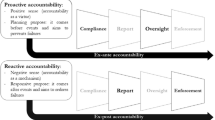Abstract
In our information societies, tasks and decisions are increasingly outsourced to automated systems, machines, and artificial agents that mediate human relationships, by taking decisions and acting on the basis of algorithms. This raises a critical issue: how are algorithmic procedures and applications to be appraised and governed? This question needs to be investigated, if one wishes to avoid the traps of ICTs ending up in isolating humans behind their screens and digital delegates, or harnessing them in a passive role, by curtailing their freedom and autonomy.
Similar content being viewed by others
References
Barabási, L., & Albert, R. (1999). Emergence of scaling in random networks. Science, 286(5439), 509–512.
Barocas S., Hood S., and Ziewitz M. (2013), “Governing algorithms: a provocation piece” (March 29, 2013), available at SSRN: https://ssrn.com/abstract=2245322. Accessed 1 Oct 2018.
Daston L.-J. (2013); “How reason became rationality”, Max Planck Institute for the history of science, available at http://www.mpiwg-berlin.mpg.de/en/research/projects/DeptII_Daston_Reason/index_html. Accessed 1 Oct 2018.
Floridi, L. (2014). The fourth revolution. How the infosphere is reshaping human reality. Oxford: Oxford University Press.
Gillespie, T. (2013). The relevance of algorithms. In T. Gillespie, P. Boczkowski, & K. Foot (Eds.), Media technologies: essays on communication, materiality, and society (pp. 167–194). Cambridge, MA: MIT Press.
Hawking S., Musk E., Gates B. et al. (2015), “Research priorities for robust and beneficial artificial intelligence: an open letter”, available at: https://futureoflife.org/ai-open-letter. Accessed 1 Oct 2018.
Luhmann, N. (1999). Trust: a mechanism for the reduction of social complexity. In N. Luhmann (Ed.), Trust and power: two works (pp. 1–103). New York: Wiley.
Masterton G., Olsson E., and Angere S. (2016), “Linking as voting: how the Condorcet jury theorem in political science is relevant to webometrics”, in Scientometrics, Volume 106, Issue 3, pp. 945–966.
Pasquale, F. (2015). The black box society: the secret algorithms that control money and information. Boston: Harvard University Press.
Author information
Authors and Affiliations
Corresponding author
Rights and permissions
About this article
Cite this article
D’Agostino, M., Durante, M. Introduction: the Governance of Algorithms. Philos. Technol. 31, 499–505 (2018). https://doi.org/10.1007/s13347-018-0337-z
Received:
Accepted:
Published:
Issue Date:
DOI: https://doi.org/10.1007/s13347-018-0337-z



